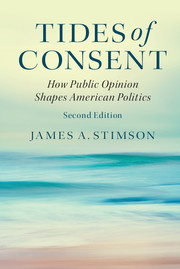Book contents
- Frontmatter
- Contents
- List of Figures
- List of Tables
- Preface to the Second Edition
- Preface to the First Edition: The Shutdown
- Acknowledgments
- 1 Opinion Flows
- 2 What the Public Wants of Government
- 3 Left and Right Movements in Preference
- 4 The Great Horse Race: Finding Meaning in Presidential Campaigns
- 5 Between the Campaigns: Public Approval and Disapproval of Government
- 6 On Politics at the Margin
- Bibliography
- Index
Preface to the Second Edition
Published online by Cambridge University Press: 05 September 2015
- Frontmatter
- Contents
- List of Figures
- List of Tables
- Preface to the Second Edition
- Preface to the First Edition: The Shutdown
- Acknowledgments
- 1 Opinion Flows
- 2 What the Public Wants of Government
- 3 Left and Right Movements in Preference
- 4 The Great Horse Race: Finding Meaning in Presidential Campaigns
- 5 Between the Campaigns: Public Approval and Disapproval of Government
- 6 On Politics at the Margin
- Bibliography
- Index
Summary
Following a defiant speech at ground zero in New York City, George W. Bush, just a few months into his first term, was among the most approved presidents of all time. By 2002 American troops, in alliance with Afghans, had succeeded in removing the Taliban from control of Afghanistan. The war to come in Iraq was then just speculation. After an unusual four-year run of budget surpluses, the budget of the U.S. government was newly in deficit from a recession and tax cut in 2001 – a later cut to come in 2003 was not yet on the horizon. Barack Obama then represented the 13th District of Illinois in the Illinois state Senate and was a complete unknown to political sophisticates in Washington. The American economy then was in the early stages of recovery from a fairly typical postwar recession beginning in March 2001. The housing bubble that would eventually crash the worldwide economy would have then been too small to notice. A financial panic of a scale comparable to the one that preceded the Great Depression was thought not to be possible in a modern market economy. These were the facts on the ground when I did much of the research and writing for the first edition of Tides of Consent in 2002.
In many ways the America of 2002 would be hard to recognize today. Much has changed since then. So much of what I wrote in 2002 bears reexamination in light of a twelve-year newer perspective. That is two separable tasks. One is simply bringing things up to date. In this edition I have decided, where possible, to bring analyses up through the end of the Obama first term and the 2012 presidential election, although I occasionally exploit data as new as June 2014. The goal of updating is just to make things current, to end the story well into the second decade of the twenty-first century rather than at the century's outset.
But also new data can lead to new conclusions. The conclusions of the longitudinal analyses were based on robust samples. Adding some 10 to 15 percent new cases to them should not often alter the patterns that they show, but it does open the possibility. One such case will be seen in Chapter 4 on the presidential election horse race.
- Type
- Chapter
- Information
- Tides of ConsentHow Public Opinion Shapes American Politics, pp. xiii - xivPublisher: Cambridge University PressPrint publication year: 2015



